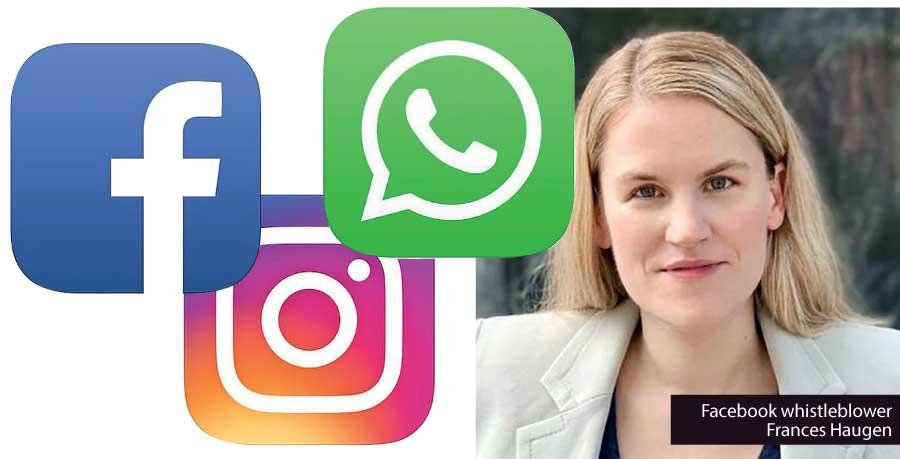Reply To:
Name - Reply Comment

Yes, it did really happen. A social media giant, whose three platforms Facebook, WhatsApp and Instagram between them have a global user base of 3.5 billion, yesterday sent engineers to its servers in California to reset them. Just like most of us would go looking for the Wi-Fi router when the connection glitches out.
between them have a global user base of 3.5 billion, yesterday sent engineers to its servers in California to reset them. Just like most of us would go looking for the Wi-Fi router when the connection glitches out.
It was a big story. The 6-hour outage was the longest recorded affecting the Facebook and linked platforms. It was like a federal nation of three states, there is no nation like that for real with 3.5 billion citizens who suddenly could not communicate internally among its citizens or outside as well.
"What I have found more interesting has been how Sri Lankan media have become by and large acquiescent to Facebook’s role. These include not only journalists but also organisations working on media and investigative journalism. I am by no means arguing that the media should not engage Facebook’s training or be local partners in the trainings."
Big story
But was it the biggest story to come out on Facebook last week? Not really. And I am not writing about this big story. But I want to talk about the other bigger and bad story.
This story came out the day before, on Monday. When Frances Haugen, who came forward as the latest whistle blower from Facebook. She worked at Facebook from June 2019, till this May as a product manager.
Frances Haugen’s last message on Facebook internal message board read “I don’t hate Facebook. I love it, I want to save it.” She was the source for a series of reports on Facebook by the Wall Street Journal. She was part of Facebook’s civic integrity team that looked into election integrity.
However, that team was disbanded after the last US elections. Haugen also lost a close personal friendship when the relationship came under strain due to her friend’s descent into social media fed conspiracy rabbit holes.
“During her time at Facebook, Frances became increasingly alarmed by the choices the company makes prioritizing their own profits over public safety and putting people’s lives at risk. As a last resort and at great personal risk, Frances made the courageous decision to blow the whistle on Facebook,” her personal website says.
In her testimony to US Senate subcommittee on Consumer Protection, Product safety and Data security she said: “I saw that Facebook repeatedly encountered conflicts between its own profits and our safety. Facebook consistently resolved those conflicts in favour of its own profits. The result has been a system that amplifies division, extremism and polarisation – and undermining societies around the world.”
We have seen the results of these actions in Sri Lanka firsthand. Pressure will mount from this latest round of revelations and the outage. Sooner than later, Facebook would have to change or would have to be made to change.
"During her time at Facebook, Frances became increasingly alarmed by the choices the company makes prioritizing their own profits over public safety and putting people’s lives at risk. As a last resort and at great personal risk, Frances made the courageous decision to blow the whistle on Facebook"
Facebook role in Sri Lanka has been an interesting one. By all accounts it has expanded its resources dealing with Sri Lanka. Same cannot be said of its transparency on those resources.
What I have found more interesting has been how Sri Lankan media have become by and large acquiescent to Facebook’s role. These include not only journalists but also organisations working on media and investigative journalism. I am by no means arguing that the media should not engage Facebook’s training or be local partners in the trainings. They should be, but they should not forget that their prime obligation is for the public good.
In uncanny parrels, as Haugen said these journalists and organisations also seem to be deciding on their own profits and brand marketability over public safety.
When Facebook first began working with local organisations and journalists I got in touch with one of the local organisations working as a partner. I asked them why these engagements were all off the record and mainly dealt with building skills on how journalists could use Facebook. There was nothing that entailed any kind opportunity to for local journalists to work on stories on Facebook or to seek on the record engagements. I was told that the local partners were looking into encouraging and providing resources for Sri Lankan journalists to do investigative stories on Facebook and Sri Lanka. Two years later, the wait continues. To my utter dismay, I once found out that a holding company of large Sri Lankan digital platform was one of Facebook’s Sri Lankan ad partners.
Notwithstanding the public posturing for free press and all that is connected with that notion by one of the platform’s main journalists, the chances of any deep-dive, even a tiny toe-in to the murky dealings of Facebook in Sri Lanka is unlikely to come from that platform.
Sadly, there is not much hope also of any such journalism or anything remotely connected from Sri Lankan media community.
The writer is a journalism researcher and a writer. He can be contacted on
[email protected]